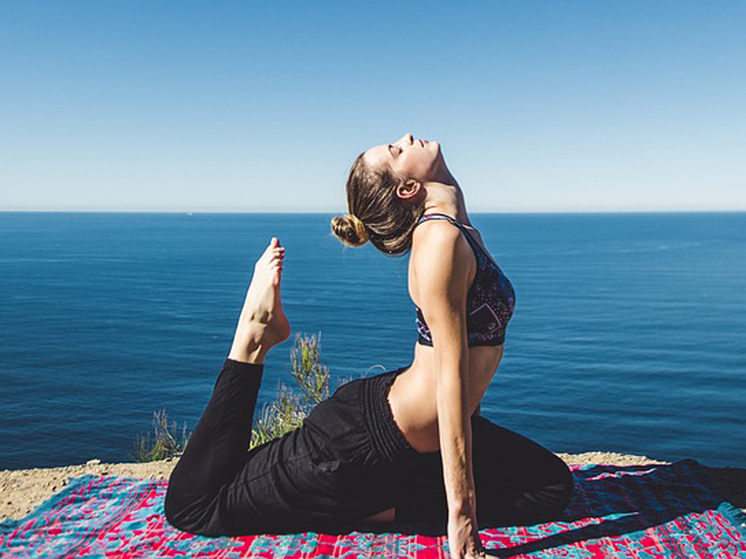Named the benefits of hiking and yoga against cancer
[ad_1]

Research shows that walking for 30 minutes a day and yoga can help reduce fatigue in cancer patients and reduce the risk of the disease spreading, recurring, or dying.
According to The Guardian, more than 18 million people worldwide develop cancer every year. It is well known that a sedentary lifestyle increases the risk of developing various forms of the disease.
Now, the world’s leading cancer researchers are learning more about the benefits of being active after a diagnosis. For decades, many oncologists and medical professionals remained reluctant to force patients to exercise after sometimes debilitating treatment regimens. But the situation seems to be changing.
Three studies presented at the annual meeting of the American Society of Clinical Oncology (ASCO), the world’s largest cancer conference, confirm the growing body of evidence that physical activity can help, not hinder, patients.
“It used to be, ‘You’re sick, calm down and rest,'” says Dr. Melissa Hudson, a leading expert on cancer survival, at a conference in Chicago. Nowadays, a growing number of doctors are of the opinion that patients should resume exercise, even if gradually at first, “better sooner than later”.
The first study was a randomized control trial, the gold standard in medical research looking at yoga’s effect on inflammation. Inflammation can be a powerful driver in the development of cancer, promoting tumor growth and spread throughout the body.
More than 500 cancer patients with an average age of 56 from across the United States participated in the study. All of them were treated for this disease in the period from two months to five years ago.
Participants were randomized to yoga or health education classes for a month. Each group took part in 75-minute sessions twice a week for four weeks.
The patients then underwent a series of blood tests. A study by the University of Rochester Medical Center found that those who practiced yoga had “significantly lower levels of pro-inflammatory markers” compared to patients in the other group.
“Our data suggest that yoga significantly reduces inflammation in cancer survivors,” the study authors wrote in a report published at the ASCO meeting. “Clinicians should consider prescribing yoga to survivors experiencing inflammation, which can lead to high chronic toxicity and an increased risk of progression, recurrence, and secondary cancer.”
Karen Mustian, lead researcher, adds: “What I tell doctors is that you should tell them [онкологическим больным] yoga as an option and you should help them find places in their community where they can do it.”
Twenty years ago, she added, there was a tendency to think that all cancer patients should take it easy, but now most doctors recommend exercise.
In a second study, also conducted by the University of Rochester Medical Center, researchers examined the effects of yoga on fatigue and quality of life.
One hundred and seventy-three patients aged 60 years and older took part in the study. Again, the participants were divided into two groups. They attended 75-minute yoga classes or health education classes twice a week for four weeks. The study showed that yoga is better at helping to relieve fatigue and maintain quality of life.
A third study found that active cancer patients can reduce their risk of death by almost a fifth.
The six-year study, led by Dr. Jurema Telles de Oliveira Lima of the Institute of Integrative Medicine in Brazil, followed more than 2,600 cancer patients in Brazil.
Patients were ranked according to their level of activity, with “active” being those who took at least one 30-minute walk five days a week, writes The Guardian.
The results showed that the risk of death was higher in those who led a sedentary lifestyle. After 180 days, 90% of people in the active group were still alive, compared to 74% in the sedentary group.
Dr. Lima said that anything cancer patients can do to avoid prolonged sitting or lying down, no matter how little they can do, can be helpful. Even doing light housework or getting groceries home can make a difference, she says.
“We also have to educate the family,” she added. “Because very often the family wants to protect an older person when they have cancer, like, ‘I’m not going to let him do anything or go anywhere.’ We have to tell the family what it is [физическая активность] may be better for the patient and also on a psychological level.”
Jim Burt, Executive Director of Programs at the UK National Academy of Social Services, who was not involved in the research, said: “This study confirms a growing body of evidence demonstrating the vast and varied benefits of exercise for physical and mental health.”
[ad_2]
Source link








